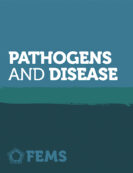Pathogens and Disease Best Postdoc Talk: Francesca Torelli
We send our congratulations to Francesca Torelli, who won the Best Postdoc Talk at ToxoUK. This award is sponsored by our journal Pathogens and Disease.
 ToxoUK took place on the 13-14th of December 2021 in Cambridge, UK. Francesca‘s winning talk was titled “Targeted in vivo screens identify GRA12 as the most important common virulence factor for Toxoplasma survival”.
ToxoUK took place on the 13-14th of December 2021 in Cambridge, UK. Francesca‘s winning talk was titled “Targeted in vivo screens identify GRA12 as the most important common virulence factor for Toxoplasma survival”.
Read our interview with Francesca about her research below:
What is your current position, and what was your scientific journey to get there?
I am currently a postdoctoral fellow at the Francis Crick Institute in London working on what is considered the most successful parasite on Earth: Toxoplasma gondii. After years working on it I still find astonishing that Toxoplasma is able to infect and replicate in any nucleated cell type and any warm-blooded animal species! I am an Italian scientist trained in Medical Biotechnology and my love for Parasitology started right after my master degree: once you look at them down the microscope it’s hard to go back. However, parasites are not just beautiful to look at: the biology we can learn from thousands of years of co-evolution and such a tight host-pathogen interface is mind-blowing and still largely to discover. I did my PhD work in Berlin at the Robert Koch Institut within a parasite-focussed doctoral program that helped me to learn broadly about Parasitology. In my project I studied how certain species of rodents might be key elements for Toxoplasma transmission due to polymorphisms in their immune genes. After my PhD I wanted to continue to do research, but I chose to shift my focus from the host to the parasite itself and to apply the latest available technologies for studying it. I then got granted a DFG fellowship to continue my work on Toxoplasma here in London in the lab of Moritz Treeck.”
Could you describe the research your presentation covered?
My major interest is how Toxoplasma manages to survive and thrive in such a vast host range. The way the parasite survives intracellular killing is by secreting proteins that help protecting its replicative niche and hijack the host immune response. We now know that Toxoplasma secretes more than 200 proteins after invasion, however the vast majority of them has still an unknown function. In my project I apply targeted CRISPR-Cas9 genetic screens previously optimised in the Treeck lab to identify in a high-throughput manner which of these secreted proteins is crucial for parasite survival. I performed such screens both in vivo and in vitro in different host species and could identify known and novel virulence factors. Importantly, I decided to investigate both pathogenic and avirulent Toxoplasma strains, to be able to identify the core factors that contribute to the broad diffusion of this parasite that causes chronic infections in one third of the human population alone. All experiments pinpoint to one specific virulence factor that appears to contribute the most to Toxoplasma survival regardless of the parasite or host genetic background, and could explain the parasite’s undisputed record in infection. I am currently unraveling the mechanism of action of this protein and the Treeck lab long-established experience in proteomic studies sets the perfect environment for this task.”

What do you hope to focus your research on in the future?
With my passion for Parasitology I aim to continue to work in this field and to share my knowledge and enthusiasm with as many people as I can reach. In terms of topic of research I am particularly fascinated by persistence, and by how a pathogen can adapt to different environments or fine-tune the host response to its own needs. What are the tools beyond such flexibility? In this regard Toxoplasma with its broad host spectrum represents a perfect case, but there are numerous other examples offered by different pathogens in nature. The discovery of proteins that are contributing to pathogens’ adaptability will have major implications in our understanding of basic biology and in devising strategies to control the spread of infectious agents.”
–
We use income from the FEMS Journals to fund grants, awards, and projects, and to support our knowledge sharing events and initiatives. Consider publishing your research with our journals to help the global microbiology community.
All but one of the FEMS journals are fully open access (OA), with one journal, FEMS Microbiology Letters, offering free-to-publish and OA options. Open access is key to supporting the FEMS mission of disseminating high quality research as widely as possible: when high quality, peer reviewed sound science is open access, anyone, anywhere in the world with an internet connection, can read it.







